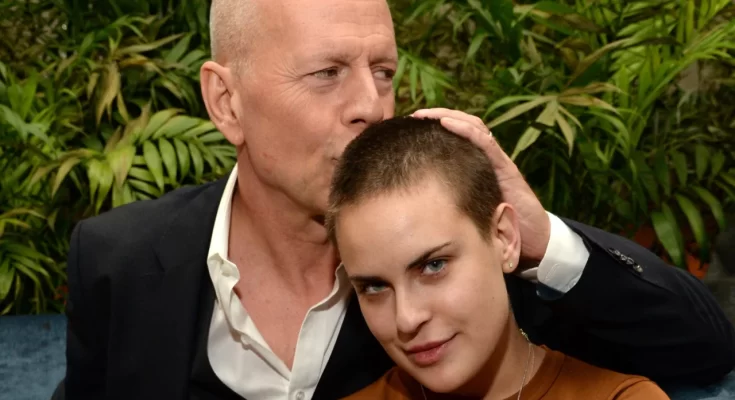Tallulah Willis, the daughter of Hollywood actor Bruce Willis and Demi Moore, has bravely shared her emotional journey coming to terms with her father’s frontotemporal dementia (FTD) diagnosis. In a heartfelt first-person essay published in Vogue, the 29-year-old detailed the impact of the illness on her family’s life.
In her poignant account, Tallulah described her struggle to reconcile the present and the past when discussing her father. She explained, “I keep flipping between the present and the past when I talk about Bruce: he is, he was, he is, he was. That’s because I have hopes for my father that I’m so reluctant to let go of.”
The initial signs of her father’s condition were misunderstood, with the family attributing them to aphasia, a condition that affects communication. However, it was later revealed that Bruce Willis is living with FTD, which primarily affects the areas of the brain associated with personality, behavior, and language.
Reflecting on her father’s journey, Tallulah wrote, “I’ve known that something was wrong for a long time. It started out with a kind of vague unresponsiveness, which the family chalked up to Hollywood hearing loss: ‘Speak up! ‘Die Hard’ messed with Dad’s ears.'” She also candidly admitted feeling a personal sting as her father’s unresponsiveness increased, assuming he had lost interest in her.
Tallulah, who has been open about her own mental health struggles, including ADHD, Borderline Personality Disorder, and anorexia nervosa, confessed to her initial avoidance and denial in facing her father’s decline. She acknowledged that her own battles with illness made it difficult to confront the reality of his condition.
However, following a period of recovery, Tallulah has found solace and strength, enabling her to be fully present in her relationship with her father. She shared that she now captures every moment with him through photographs and cherishes every voicemail from him, documenting their time together.
“In the past I was so afraid of being destroyed by sadness, but finally, I feel that I can show up and be relied upon,” Tallulah expressed. “I know that trials are looming, that this is the beginning of grief, but that whole thing about loving yourself before you can love somebody else – it’s real.”
Tallulah’s courageous essay sheds light on the profound impact of frontotemporal dementia on both the individual and their loved ones. Her openness and vulnerability serve as a reminder of the importance of compassion and understanding in supporting those facing such challenges.





